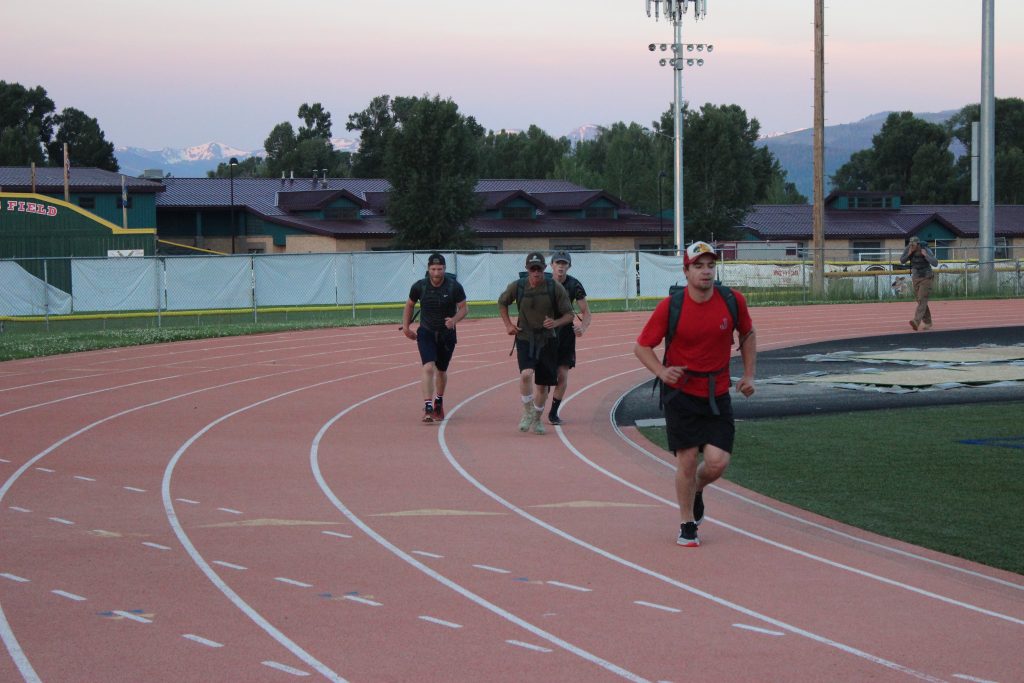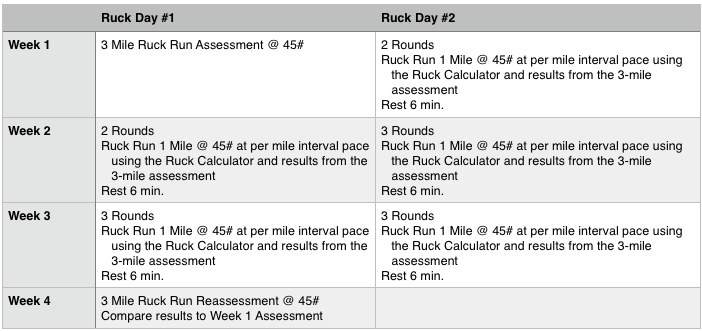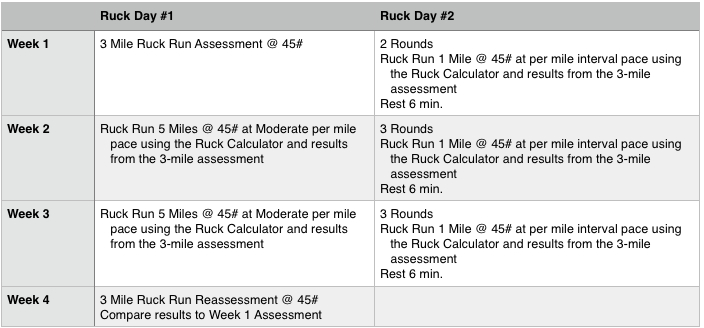
By Charlie Bausman
In 2012, our tactical lab rats began a second iteration of our Geek Cycle. With this cycle, we pivoted to improving ruck run speed.
We’ve programmed interval ruck progressions based on varying assessment distances for Operator Sessions, selection plans, and ruck improvement plans. Our rule of thumb for the intervals is one-third of the assessment distance, at a pace that is 20% faster than the assessment pace.
For this cycle, we will use an assessment distance of three miles while wearing a 45# ruck. This is a fairly short assessment – we are constrained by the amount of time we have access to the lab rats. The 45# rucking load is standard for our programming, as well as for the rucking tests used in the military.
Following the initial assessment results, we’ll split the lab rats into two groups – Group A and Group B. The two groups will use different methods of progression, training rucking speed for three weeks. Following the mini-cycle, we’ll re-assess the athletes to see which group had the greatest overall improvement.
The Initial Assessment
We used a 400m track to time the lab rats 3-mile ruck run. Each lap was recorded as well as the final assessment time. Lab rat results below.

Overall, this is a fast group. Because the majority of the lab rats are so close in the assessment times, it should provide us two balanced groups in terms of speed for testing. Vinny is new to ruck running and the biggest athlete by a wide margin. It will be interesting to observe how his times progress as he becomes more familiar with it.
Group A Progression
Group A will conduct 1-mile intervals twice a week on Tuesday’s and Thursday’s. Using our rucking calculator, each athlete will be prescribed a per-mile time for the rucking intervals. They will begin with 2 Rounds of 1-mile intervals and then progress to 3 Rounds of 1-mile intervals.

Group B Progression
Group B will also ruck twice a week on Tuesday’s and Thursday’s. One day a week they will conduct 1-mile intervals in the same format as Group A. The other rucking day will consist of a 5-mile ruck at 45#, but at a slower, steady pace. Our rucking calculator provides a ‘moderate per mile’ pace, which the athletes maintain for the duration of the 5-mile ruck. This pace is 10-20% slower than the athlete’s 3-mile assessment per mile pace.

Considerations and Thoughts Going Forward
Our primary tool for developing speed over ground in running or rucking is intervals. We’ve observed rucking improvement via intervals here in the gym, as well as the feedback provided by those following MTI programming online. The question isn’t whether intervals work or not, but rather are they more effective when complemented with longer, steady-state efforts. We’re not sure.
The loading at 45# is standard across the military services for testing purposes. Some will assign this weight ‘dry,’ meaning it must weight 45# before including water and/or Meals Ready to Eat (MRE’s). This can increase the weight significantly. For the purposes of our testing the lab rats have made sandbags that weight 43#. Including the weight of the ruck, it makes for an even 45# load. The lab rats did not carry any water/food during their assessment, and won’t during the follow on progressions.
An additional consideration is terrain. All progressions and assessments are completed on a flat 400m track. In previous studies, we had analyzed different systems of predicting rate of movement based on terrain changes (incline/decline) and developed the MTI Route Card. How might terrain change affect results between Group A and Group B? Again, we’re not sure. For this Geek Cycle, we’ll only use the track, but we may look at further testing this idea on varied terrain.
In order to focus on the rucking testing, the lab rats from Group A and Group B will conduct the same gym training on Monday and Wednesdays. The focus for gym work will be strength and chassis integrity. With both groups completing the same gym sessions, we’ll have fewer variables in analyzing the results of the ruck run test.
Questions, Comments, Feedback? Email coach@mtntactical.com
You Might Also Like MTI’s Run & Ruck Improvement Training Plan
